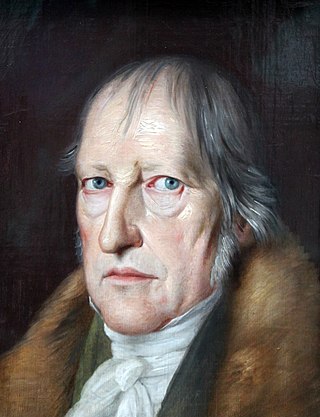
Georg Wilhelm Friedrich Hegel was a German philosopher and one of the most influential figures of German idealism and 19th-century philosophy. His influence extends across the entire range of contemporary philosophical topics, from metaphysical issues in epistemology and ontology, to political philosophy, the philosophy of history, philosophy of art, philosophy of religion, and the history of philosophy.
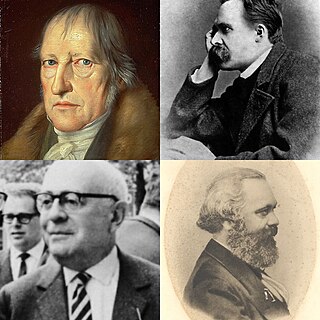
German philosophy, meaning philosophy in the German language or philosophy by German people, in its diversity, is fundamental for both the analytic and continental traditions. It covers figures such as Gottfried Wilhelm Leibniz, Immanuel Kant, Georg Wilhelm Friedrich Hegel, Karl Marx, Friedrich Nietzsche, Martin Heidegger, Ludwig Wittgenstein, the Vienna Circle, and the Frankfurt School, who now count among the most famous and studied philosophers of all time. They are central to major philosophical movements such as rationalism, German idealism, Romanticism, dialectical materialism, existentialism, phenomenology, hermeneutics, logical positivism, and critical theory. The Danish philosopher Søren Kierkegaard is often also included in surveys of German philosophy due to his extensive engagement with German thinkers.

Jakob Friedrich Fries was a German post-Kantian philosopher and mathematician.
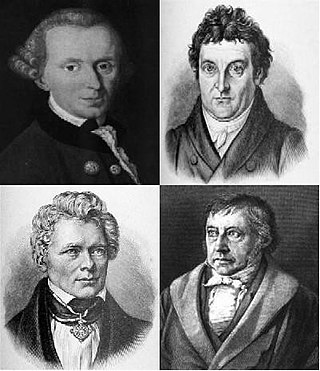
German idealism is a philosophical movement that emerged in Germany in the late 18th and early 19th centuries. It developed out of the work of Immanuel Kant in the 1780s and 1790s, and was closely linked both with Romanticism and the revolutionary politics of the Enlightenment. The period of German idealism after Kant is also known as post-Kantian idealism or simply post-Kantianism. One scheme divides German idealists into transcendental idealists, associated with Kant and Fichte, and absolute idealists, associated with Schelling and Hegel.

Johann Karl Friedrich Rosenkranz was a German philosopher and pedagogue.

Ernst Alfred Cassirer was a German philosopher. Trained within the Neo-Kantian Marburg School, he initially followed his mentor Hermann Cohen in attempting to supply an idealistic philosophy of science.
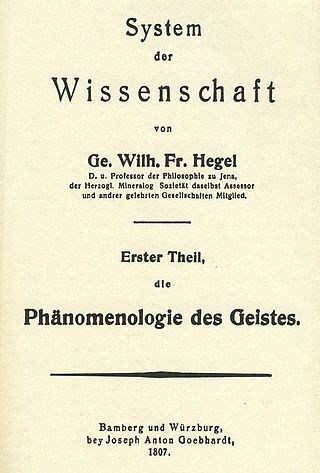
The Phenomenology of Spirit is the most widely-discussed philosophical work of Georg Wilhelm Friedrich Hegel; its German title can be translated as either The Phenomenology of Spirit or The Phenomenology of Mind. Hegel described the work, published in 1807, as an "exposition of the coming to be of knowledge". This is explicated through a necessary self-origination and dissolution of "the various shapes of spirit as stations on the way through which spirit becomes pure knowledge".

Wilhelm Dilthey was a German historian, psychologist, sociologist, and hermeneutic philosopher, who held G. W. F. Hegel's Chair in Philosophy at the University of Berlin. As a polymathic philosopher, working in a modern research university, Dilthey's research interests revolved around questions of scientific methodology, historical evidence and history's status as a science. He could be considered an empiricist, in contrast to the idealism prevalent in Germany at the time, but his account of what constitutes the empirical and experiential differs from British empiricism and positivism in its central epistemological and ontological assumptions, which are drawn from German literary and philosophical traditions.

Absolute idealism is chiefly associated with Friedrich Schelling and G. W. F. Hegel, both of whom were German idealist philosophers in the 19th century. The label has also been attached to others such as Josiah Royce, an American philosopher who was greatly influenced by Hegel's work, and the British idealists.

In late modern continental philosophy, neo-Kantianism was a revival of the 18th-century philosophy of Immanuel Kant. The neo-Kantians sought to develop and clarify Kant's theories, particularly his concept of the thing-in-itself and his moral philosophy.

Wilhelm Traugott Krug was a German philosopher and writer. He is considered to be part of the Kantian School of logic.
Robert Buford Pippin is an American philosopher. He is the Evelyn Stefansson Nef Distinguished Service Professor in the John U. Nef Committee on Social Thought, the Department of Philosophy, and the college at the University of Chicago.
Dieter Henrich was a German philosopher. A contemporary thinker in the tradition of German idealism, Henrich is considered "one of the most respected and frequently cited philosophers in Germany today", whose "extensive and highly innovative studies of German Idealism and his systematic analyses of subjectivity have significantly impacted on advanced German philosophical and theological debates."

Josef Simon was a contemporary German philosopher and professor of the University of Bonn, born in Hupperath. He wrote extensively on metaphysics, epistemology, the philosophy of German idealism and various philosophers, mainly Kant, Hamann and Nietzsche. Perhaps Simon's most influential work has been in the philosophy of language. His main work, Philosophie des Zeichens, has been influenced by, among others, Kant, Hegel, Peirce and Wittgenstein, Hamann, Humboldt or Nietzsche.

The following list of works by German philosopher Georg Wilhelm Friedrich Hegel (1770–1831).
Douglas Moggach is a professor at the University of Ottawa and life member of Clare Hall, Cambridge. He is Honorary Professor of Philosophy at the University of Sydney, and has held visiting appointments at Sidney Sussex College and King's College, Cambridge, the Centre for History and Economics, Cambridge, Queen Mary University of London, the Scuola Normale Superiore di Pisa., and the Fondazione San Carlo di Modena,where he taught a graduate seminar in Italian on German Idealism. Moggach has also held the University Research Chair in Political Thought at the University of Ottawa. In 2007, he won the Killam Research Fellowship awarded by the Canada Council for the Arts. He was named Distinguished University Professor at University of Ottawa in 2011.
The following is a list of the major events in the history of German idealism, along with related historical events.

Vittorio Hösle is an Italian-born German philosopher. He has authored works including Hegels System (1987), Moral und Politik, and Der philosophische Dialog (2006).
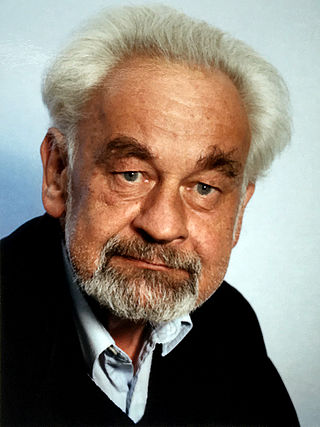
Thomas Seebohm was a phenomenological philosopher whose wide-ranging interests included, among others, Immanuel Kant, Edmund Husserl, hermeneutics, and logic. Other areas of Professor Seebohm's interests included the history of philosophy, philosophy of history, philosophy of the formal sciences, methodology and philosophy of the human sciences, the history of 19th century British Empiricism, American pragmatism, analytic philosophy, philosophy of law and practical philosophy, and the development of the history of philosophy in Eastern Europe. Despite this diverse span of interests, Seebohm was chiefly known as a phenomenologist, who "above all...considered himself a creative phenomenologist, who as a critically reflecting philosopher would look at all major issues with which he became confronted, from a transcendental phenomenological point of view."
Joachim Ritter was a German philosopher and founder of the so-called Ritter School of liberal conservatism.













